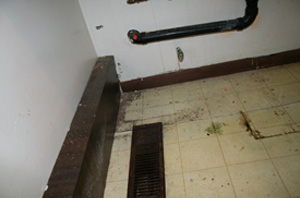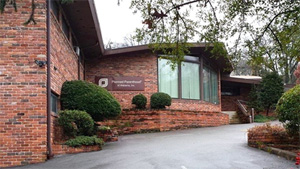Gov. Brownback asked to look into delay tactics that are placing women at risk
By Cheryl Sullenger
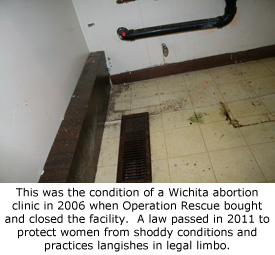 Topeka, KS – Over 2 ½ years after its passage, a once, high-profile abortion clinic licensing law languishes in a Shawnee County Court all but forgotten while abortion clinics that could not or would not comply continue to operate well below standards that the law was supposed to establish for the public protection.
Topeka, KS – Over 2 ½ years after its passage, a once, high-profile abortion clinic licensing law languishes in a Shawnee County Court all but forgotten while abortion clinics that could not or would not comply continue to operate well below standards that the law was supposed to establish for the public protection.
“It appears that the State of Kansas has either inadvertently or intentionally forgotten about this important 2011 clinic licensing law that remains under a temporary restraining order in State Court. Meanwhile, women are denied the protections of this legislation that overwhelmingly passed the Legislature and was signed into law by Gov. Sam Brownback,” said Troy Newman, President of Operation Rescue. “It seems wrong one county judge to completely thwart the legal process.”
Efforts to create clinic licensing and standards date back at least to 2003 when then-Governor Kathleen Sebelius vetoed the first of three efforts to pass laws that would hold abortion clinics, which had remained entirely unaccountable in the state for decades. Public support for such regulation was strong after documented evidence surfaced of massive abortion abuses that were taking place at Kansas abortion facilities. That evidence eventually led to the following actions:
• Closure of Krishna Rajanna’s squalid Kansas City abortion clinic and the revocation of his medical license.
• License revocation of abortionist Ann Kristin Neuhaus for providing incompetent abortion referrals to late-term abortionist George Tiller in Wichita.
• The filing of a 30-count criminal case against late-term Tiller by former Attorney General Phill Kline that was dismissed on dubious jurisdictional grounds – not the merits of the case.
• An 11-count disciplinary petition against Tiller involving illegal late-term abortions filed by the Kansas Board of Healing Arts that was pending at the time of his death.
• 107 criminal counts against Planned Parenthood in Overland Park, which was dismissed not on the merits but on the fact that crucial evidence against Planned Parenthood was illegally destroyed by an unknown person or persons under the administration of former Attorney General Steve Six, a Sebelius appointee.

“I don’t believe semi-clean to be okay. I don’t believe it to be okay for poor women. I don’t believe it to be okay for rich women,” Republican State Sen. Garrett Love said at the time.
The clinic licensing requirements that were to take effect on July 1, 2011, would have placed abortion facilities under the oversight of the Kansas Department of Health and Environment and would have required abortion clinics to meet a wide range of standards from mandating that hallways are wide enough for a gurney to pass, to ensuring that abortionists – some of which fly in from other states to do abortions in Kansas – provide continuity of care in the event of emergencies by maintaining local hospital privileges. Mandatory inspections were required to obtain and maintain licensing.
Of the three Kansas abortion clinics in operation at that time, only Planned Parenthood of Overland Park was inspected and found to meet all the licensing requirements after initially being found deficient in several areas.
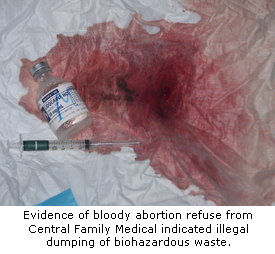 Another abortion clinic in Kansas City, Aid for Women, also known as Central Family Planning, failed to receive licensing based on its application and was never inspected. Operation Rescue later revealed documentation of numerous abortion abuses occurring at that clinic, including the refusal to report child sex abuse and the illegal dumping of private patient information and bloody refuse from abortions. That clinic currently remains under investigation by the Kansas State Board of Healing Arts based on information provided by Operation Rescue.
Another abortion clinic in Kansas City, Aid for Women, also known as Central Family Planning, failed to receive licensing based on its application and was never inspected. Operation Rescue later revealed documentation of numerous abortion abuses occurring at that clinic, including the refusal to report child sex abuse and the illegal dumping of private patient information and bloody refuse from abortions. That clinic currently remains under investigation by the Kansas State Board of Healing Arts based on information provided by Operation Rescue.
Herbert Hodes and his daughter Tracy Nauser, a father-daughter team of abortionists from Overland Park that operate a third abortion clinic in Kansas, refused the mandatory inspection in 2011 and instead filed suit in Federal Court. Once it became obvious that their Federal challenge had little hope of success, Hodes and Nauser dropped that suit and refiled their challenge in state court where the benches where the political climate remains one that protects abortion businesses over the lives and safety of women. That case is Hodes v. Moser, Shawnee County Court Case Number 11C 001298.
That strategy worked in favor of the abortion clinics, causing endless delays and eventually relegating the case to near oblivion. A temporary restraining order continues to block enforcement of the law and allows substandard clinics to continue without accountability.
“The people of the state have every right to expect that laws like that should be aggressively defended, especially when it involves public safety issues. What is happening with this law I consider a betrayal of the people of Kansas and the rule of law,” said Newman.
The last hearing took place over a year ago, in August, 2012, where a motion was made by Assistant Attorney General Steve McAllister to dismiss the case. Shawnee County District Judge Franklin Theis denied the motion, but stated that he believed that abortion clinics required some oversight.
“Abortion was originally a back alley business and obviously we don’t want the back alley brought into four walls. There’s enough concern that somebody ought to keep an eye on it,” said Judge Theis stated at the time.
Yet ironically, his ruling placed the case in limbo, with no further court action since that time, ensuring that abortion clinics in Kansas continue to operate without oversight.
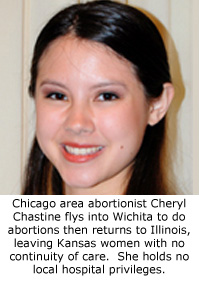 To make matters worse, in April, 2013, another abortion clinic opened in Wichita, at the former location of George Tiller’s infamous late-term abortion clinic. Unable to secure a local physician, South Wind Women’s Center has hired a string of out-of-state abortionists who fly in to Wichita then fly out, leaving women to cope with any complications on their own. None of the South Wind abortionists have had local hospital privileges.
To make matters worse, in April, 2013, another abortion clinic opened in Wichita, at the former location of George Tiller’s infamous late-term abortion clinic. Unable to secure a local physician, South Wind Women’s Center has hired a string of out-of-state abortionists who fly in to Wichita then fly out, leaving women to cope with any complications on their own. None of the South Wind abortionists have had local hospital privileges.
Adding to the frustration with Kansas’ apparent lack of motivation to actively defend the nearly three-year-old law is a recent U.S. Supreme Court decision allowing a similar Texas law, passed just last summer, to remain in force pending a court challenge. On November 19, the nation’s Highest Court ruled 5-4 that the Texas law should not be enjoined, upholding an earlier ruling of the 5th Circuit Court of Appeals. Like Kansas, The Texas law includes mandated local hospital privileges for abortion providers that most “fly-in” abortionists cannot get due to liability issues. That Supreme Court ruling has had the effect of closing a dozen Texas abortion clinics that could not meet the new safety standards and therefore posed a danger to the public.
“In Kansas seems like the judicial system would rather risk women’s lives than take any action that might close an abortion clinic, no matter how dangerous its practices are,” said Newman. “It’s been a disappointment and an embarrassment at the same time. Political bias has no place in the courtroom. If a judge cannot move a case along in a timely manner, he should remove himself from the case. If prosecutors don’t want to prosecute, then they should be replaced with those that will do their duty,” said Newman.
The Kansas law provides a severability clause, meaning that it is possible to allow parts of the law to go into effect while the contested portions are litigated. Newman believes that sections of the law that have already been upheld in courts in other states, such as the local hospital privilege requirement, should be allowed to go into effect now, especially in light of the recent U.S. Supreme Court ruling that has blocked and injunction against a nearly identical provision in Texas.
“It only makes good sense to allow parts of the law that have already seen positive affirmation in other courts to take effect while the case is litigated,” said Newman. “It’s the right thing to do.”
Certainly the dangerous conditions and lack of abortion clinic oversight that prompted the 2011 abortion clinic licensing law remain unchanged, and may in fact be worse. Operation Rescue has learned that the Attorney General’s office has made some attempt to lift the stay that is blocking the case from proceeding, but wonders why it took 16 months for even this minimal action.
It is now up to Judge Thies to stop delaying the case and allow it to proceed. But even if Thies were to lift the stay now, the legal challenge could still take years and could very likely end up in the pro-abortion Kansas Supreme Court where the average appeal takes about 4 years.
A solution might be for prosecutors to push to “fast track” the case, especially in light of the recent Texas decision.
“If abortion clinics cannot comply with the law, as least 3 abortion clinics admit they cannot, they should rightfully be closed in the interest of public safety. We know that when abortion clinics close, the lives of women and their babies are saved, and saving lives is why this law is important,” said Newman. “Gov. Brownback should step in and personally monitor the defense of the 2011 abortion clinic licensing law to ensure that it’s being aggressively defended and working its way through the system in a timely manner.”
Operation Rescue is asking the public to contact Gov. Sam Brownback and make him aware of this dangerous situation that is leaving women vulnerable to dangerous abortion conditions and practices.

